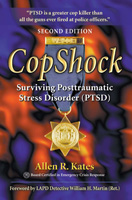
CopShock: Second Edition
Surviving Posttraumatic Stress Disorder (PTSD)
by Allen R. Kates, MFAW, BCECR
Panic Attacks and Panic Disorder
Panic attacks are common, and about
one-third of Americans experience at least one such attack every year. Although
they are the most frequently occurring type of emotional disorder or reaction,
they should not be underestimated for their ability to inflict harm. An episode
usually begins without warning and can last anywhere from a few minutes to a
half hour or longer. Attacks may be characterized by a rapid heartbeat,
sweating, trembling, chills, nausea, chest pain, dizziness and other symptoms.
Panic attacks are the primary condition in Panic Disorder, as defined by the
American Psychiatric Association. Panic attacks are sometimes considered a
precondition to PTSD.
Anxiety
Centre.com
This outstanding website is filled with
comprehensive infor-mation, help and support for those who suffer from anxiety,
stress, panic attacks, phobias, depression, and PTSD. It is beaut-ifully
assembled by Jim Folk, who suffered extremely debilitating stress and anxiety
symptoms including intense panic attacks for more than ten years. As he says, “I
went from being an out-going, healthy and excited-about-life type of person to
being always sick, almost housebound, and thinking I was losing my mind.”
Finally, he found a therapist who understood what was happening to him, and he
returned to having a normal healthy life.
This website offers not only
information, but also personal coaching by a cadre of caring professionals who
have personally experienced overwhelming anxiety—so they know what they are
talking about. Jim says you don’t have to suffer needlessly. You can beat your
condition for good. For an "Anxiety Potential Self-Test," go to
AnxietyCentre.com.
Go to: http://anxietycentre.com. Write: Jim Folk, Anxiety-Centre.com, 70 Rockbluff Close NW, Calgary,
Alberta T3G 5B2. Phone: 403-208-0091.
Anxiety Disorders Association
of America (ADAA)
The Anxiety Disorders Association of
America is the leading nonprofit organization dedicated to increasing awareness
and improving the early diagnosis, treatment, and cure of anxiety disorders
(such as PTSD and Panic Disorder) through education and research. ADAA offers
free educational information and resources about anxiety disorders, local
treatment providers, self-help groups, self-tests, clinical trials, and more.
ADAA promotes the message that anxiety disorders are real, serious and
treatable.
You may wish to complete their “PTSD Self-Test” and their
“Panic Disorder Self-Test” on their website.
Go to: http://www.adaa.org. Write: ADAA,
8730 Georgia Avenue, Suite 600, Silver Spring, MD 20910. Phone:
240-485-1001.
Anxiety Disorders Education
Program
The National Institute of Mental Health (NIMH)
features a website that describes symptoms of Panic Disorder, PTSD and other
anxiety disorders. Treatment options are also considered.
Go to: http://www.nimh.nih.gov. Click on
the “Site Map,” and then on the area you wish to access such as Panic Disorder,
PTSD, and so on. Write: National Institute of Mental Health (NIMH), Science
Writing, Press, and Dissemination Branch, 6001 Executive Blvd., Room 8184, MSC
9663, Bethesda, MD 20892-9663. Phone: 301-443-4513. Toll free:
866-615-6464.
Anxiety/Panic Attack Resource
Site
Dedicated to those who suffer from anxiety and panic
attacks, this comprehensive site features information on symptoms, medications
and treatment. Among other things, it also offers books and a chatroom.
Go
to: http://www.anxietypanic.com.
Cyberpsychologist
Created by Dr. Robert
Sarmiento who counsels many police officers in his practice, this self-help
resource focuses on depression, addictions and relationships. Its information
will help those suffering from panic attacks, providing stress management
methods. The website discusses therapy for people who don’t believe in
therapy.
Go to: http://www.cyberpsych.com. Write: Robert F. Sarmiento, Ph.D., 955 Dairy Ashford, Suite 108,
Houston, TX 77079. Phone: 281-679-0001.
Descriptions of Panic Attacks
and Panic Disorder
For numerous articles and detailed
descriptions of symptoms and treatment for panic attacks and Panic Disorder,
have a look at Internet Mental Health.
Go
to: http://www.mentalhealth.com. Search
the index for panic attacks.
National Anxiety Foundation
(NAF)
The NAF provides information on Panic Disorder, and an
online series of handbooks on its causes, cures and care.
Go to: http://www.lexington-on-line.com/naf.html. Write: Stephen M. Cox, M.D., President and Medical Director, NAF, 3135
Custer Drive, Lexington, KY 40517-4001.
Tapir, The Anxiety-Panic
Internet Resource
Tapir is a self-help network dedicated to
overcoming and curing overwhelming anxiety. As well as detailed information on
panic attacks, it provides information on PTSD.
Go to: http://www.algy.com/anxiety.